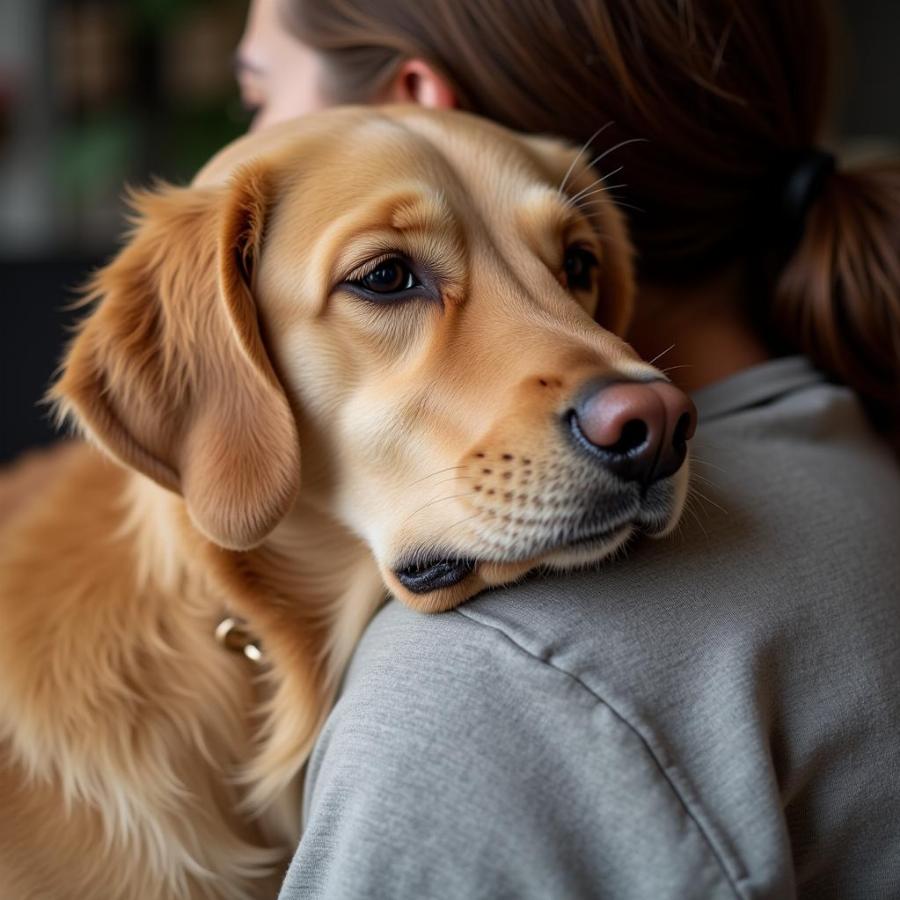Hearing your dog moan while settling down for a nap might tug at your heartstrings. You might wonder if they’re uncomfortable, in pain, or just trying to communicate their contentment. Understanding the reasons behind these noises can help you better care for your furry friend.
Why Does My Dog Moan When Lying Down?
Dogs communicate in a variety of ways, and vocalizations like moaning are just one tool in their arsenal. While a moan can sometimes signal a problem, it’s often a normal part of canine communication. Here are some common reasons why dogs moan when lying down:
1. Getting Comfortable
Just like us, dogs shift and adjust to find the perfect sleeping position. A moan or sigh might simply be your dog’s way of saying, “Ah, that’s the spot!” They might be relieving pressure on their joints, finding a position that supports their muscles, or just getting cozy.
2. Emotional Expression
Dogs are highly emotional creatures. They form strong bonds with their human families and experience a range of emotions, from joy to anxiety. A soft moan while lying next to you could be your dog’s way of expressing contentment, love, or a desire for closeness.
3. Attention-Seeking
Some dogs are masters of manipulation! If your dog has learned that moaning gets your attention—perhaps a head scratch or a treat—they might use it as a way to get what they want, even if there’s nothing wrong.
4. Dreaming
Have you ever watched your dog twitch or whimper in their sleep? Dogs experience vivid dreams just like humans. Those moans and groans might be your dog chasing squirrels in their sleep or reliving a fun day at the park.
5. Pain or Discomfort
While moaning is often benign, it can sometimes indicate that your dog is experiencing pain or discomfort. If your dog’s moans are accompanied by other changes in behavior—such as decreased appetite, lethargy, or reluctance to move—it’s crucial to consult with your veterinarian to rule out any underlying medical conditions.
When to Be Concerned
It’s important to differentiate between a dog’s normal vocalizations and signs of potential health problems.
Consult your veterinarian if:
- Your dog’s moans become more frequent or intense.
- The moaning is accompanied by other symptoms like limping, whining, or changes in behavior.
- Your dog seems to be in pain or distress.
- You notice any swelling, redness, or discharge.
How to Help Your Dog
If your dog’s moans are causing you concern, the first step is to consult with your veterinarian. Once you’ve ruled out any medical issues, here are a few things you can do to help your furry friend feel more comfortable:
- Provide a Comfortable Bed: Make sure your dog has a supportive bed that’s appropriate for their size and breed. Orthopedic beds are especially helpful for senior dogs or those with joint issues.
- Create a Safe Space: Dogs often feel most relaxed in a den-like environment. Offer your dog a quiet corner or crate where they can retreat when they need some downtime.
- Engage in Regular Exercise: Physical activity is essential for your dog’s physical and mental well-being. Make sure your dog gets plenty of exercise to keep their joints healthy and their minds stimulated.
Dog Moaning: Understanding Your Furry Friend
While it’s always best to err on the side of caution, most of the time, a dog moaning while lying down is nothing to worry about. By paying attention to your dog’s overall behavior and body language, you can learn to interpret their vocalizations and understand their needs better.
 Dog and Owner Cuddling
Dog and Owner Cuddling
FAQs:
Q: Why does my senior dog moan more often?
A: As dogs age, they may experience more joint pain or stiffness, especially when lying down.
Q: Could my dog’s moaning be a sign of cognitive decline?
A: Sometimes, increased vocalization can be a symptom of cognitive dysfunction syndrome (CDS) in older dogs.
Q: What kind of dog bed is best for joint pain?
A: Orthopedic beds, memory foam beds, and raised beds can all help alleviate joint pain in dogs.
Need More Help?
Beaut Dogs is your trusted resource for all things canine. For more information and expert advice on dog health and behavior, visit us at https://beautdogs.com. Have a specific question about your furry friend? Contact our team of experts at [email protected]—we’re here to help!